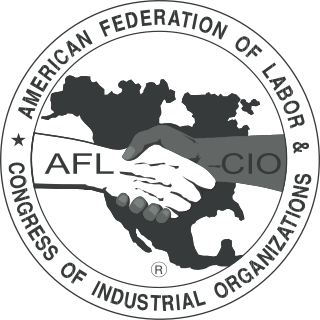Related Research Articles

The American Federation of Labor and Congress of Industrial Organizations (AFL–CIO) is the largest federation of unions in the United States. It is made up of 56 national and international unions, together representing more than 12 million active and retired workers. The AFL–CIO engages in substantial political spending and activism, typically in support of liberal or progressive policies.

The American Federation of Labor (AFL) was a national federation of labor unions in the United States founded in Columbus, Ohio, in December 1886 by an alliance of craft unions disaffected from the Knights of Labor, a national labor union. Samuel Gompers was elected the full-time president at its founding convention and reelected every year, except one, until his death in 1924. He became the major spokesperson for the union movement.
The Labor Council for Latin American Advancement (LCLAA) is a nonprofit, nonpartisan Latino organization affiliated with the AFL-CIO and the Change to Win federation. It was founded in 1972 to provide Latino trade union members in the United States with a more effective voice within the AFL-CIO, to encourage Latino participation in the democratic process, and to encourage the organization of Latino workers into labor unions.
The International Brotherhood of Paper Makers (IBPM) was a labor union representing workers involved in making paper in the United States, Canada and Newfoundland.

The International Plate Printers, Die Stampers and Engravers Union of North America is a North American labor union, one of the constituent members of the Department for Professional Employees of the AFL–CIO; and of the Canadian Labour Congress, founded in 1893. It is the result of a number of mergers of labor unions, and is headquartered in Silver Spring, Maryland
The United Shoe Workers of America (USWA) was a trade union representing workers involved in making shoes and other leather goods.
The International Stereotypers' and Electrotypers' Union (ISEU) was a labor union representing workers in two related trades in the United States and Canada.
The International Brotherhood of Bookbinders (IBB) was a labor union representing bookbinding workers in the United States and Canada.
The United Wall Paper Craftsmen of North America (UWPC) was a labor union representing wallpaper cutters and printers in the United States and Canada.
The United Brick and Clay Workers of America (UBCWA) was a labor union representing brickmakers, clay and terracotta workers and clay miners in the United States.
The Aluminum Workers' International Union (AWIU) was a labor union representing metal workers in the United States.
The Coopers' International Union of North America (CIUNA) was a labor union representing coopers in the United States and Canada.
The International Brotherhood of Pottery and Allied Workers (IBPAW) was a labor union representing workers in the pottery industry in the United States and Canada.
The United Cement, Lime and Gypsum Workers' International Union (UCLG) was a labor union representing workers involved in processing building supplies in the United States.
The American Flint Glass Workers' Union (AFGWU) was a labor union representing workers involved in making glassware and related goods in the United States and Canada.
The International Leather Goods, Plastic and Novelty Workers' Union (ILGPNWU) was a trade union representing workers involved in making bags, belts and similar goods, in the United States and Canada.
The International Jewelry Workers' Union (IJWU) was a labor union representing workers involved in making jewelry in the United States and Canada.
The United Rubber, Cork, Linoleum and Plastic Workers of America (URW) was a labor union representing workers involved in manufacturing using specific materials, in the United States and Canada.
The International Brotherhood of Blacksmiths, Drop Forgers and Helpers (IBB&H) was a labor union representing metal workers in the United States and Canada.
References
- ↑ Handbook of American Trade Unions (PDF). Washington, D.C.: United States Department of Labor. 1926. Retrieved 24 April 2022.
- 1 2 Cebula, James E. (1976). Glory and Despair (PDF). Cincinnati: University of Cincinnati. Retrieved 12 July 2022.
- ↑ "Inactive Organizations" (PDF). UMD Labor Collections. University of Maryland. Retrieved 18 April 2022.
- ↑ Durkin, Martin P. (1953). Directory of Labor Unions in the United States (PDF). Washington, D.C.: United States Department of Labor. Retrieved 19 March 2022.
- ↑ Reynolds, Lloyd G.; Killingsworth, Charles C. (1944). Trade Union Publications: The Official Journals, Convention Proceedings, and Constitutions of International Unions and Federations, 1850–1941. Baltimore: Johns Hopkins Press.